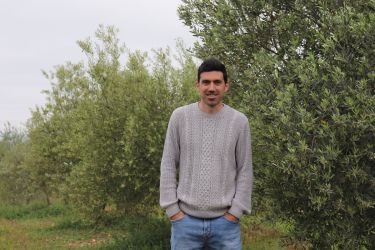The doctoral thesis of the researcher Manuel González from the UCO and the Diverfarming project demonstrates the capacity of vegetable covers for carbon sequestration from the atmosphere and for reducing greenhouse gas emissions
It has been shown that the soil is one of the greatest reservoirs of carbon in terrestrial ecosystems, since the process of CO2 sequestration contributes greatly to reducing greenhouse gases. This is the premise behind the doctoral thesis of the researcher from the Department of Agricultural Chemistry, Edaphology and Microbiology at the University of Cordoba, Spain, Manuel González Rosado, who is working within the European Diverfarming project.
 This doctor in Edaphology and Agricultural Chemistry explains that the soil of Mediterranean olive groves has an enormous capacity for carbon sequestration, because bad farming practices have been used for many years. Practices such as conventional tilling or not tilling but based on herbicides have led to the loss of CO2.
This doctor in Edaphology and Agricultural Chemistry explains that the soil of Mediterranean olive groves has an enormous capacity for carbon sequestration, because bad farming practices have been used for many years. Practices such as conventional tilling or not tilling but based on herbicides have led to the loss of CO2.
This has derived in there being very little stabilised carbon in the soil of the plots in Jaen where the study has been carried out, so currently there is a great storage capacity in this zone. “These are soils that have a great potential, because there is a great availability for storage, which provides the opportunity to capture carbon and to make it stay, with the appropriate agricultural practices,” explained Mr. González.
Among the practices studied which help to capture carbon are the introduction of vegetable cover among the alleys of the olive grove, which additionally prevents soil erosion. This is an issue that has been marked as one of the main problems facing Andalusian olive groves. The UCO researcher explains that annually this amounts to losses in excess of 10 tonnes of soil per hectare per year, and which is especially high when practices of not tilling and leaving bare soil with herbicides are used. “This could be reverted with the implementation of vegetable cover, since the erosion could be enormously reduced,” González adds.
For this reason, a change in farming practices to involve vegetable cover and which also increases productivity and promotes the regeneration of the soil properties by improving them can be considered almost “obligatory”. Moreover, he points out that conventional tilling practises and not tilling the bare soil are unsustainable practises for achieving objectives such as the initiative ‘4 per 1000’, which proposes an increase in carbon in the soil of 0.4% in the first 40 cm of soil.
However, his thesis has gone one step further, studying not only this uppermost layer but also the other soil strata. In this way he considers it particularly relevant to take into account the deep horizon in the storage of carbon since the effects vary. “We analysed complete profiles of up to 120 cm in depth and we saw that they stored 50% of carbon in these lower layers,” explained the researcher, indicating that if they had studied only the first 40 cm “the changes would not have been significant”.
In fact, the result varies even within the same plot depending on the depth referred to. It is therefore important to study the way in which carbon is not only stored, but also the way it remains at that depth, since depending on the soil fraction where the carbon is found it will have greater or lesser stability.
This thesis follows the line of farming practises proposed by the European Diverfarming project, financed by the European Commission with the H2020 call, which seeks a change in paradigm in European agriculture through the inclusion of crop diversification and sustainable farming practises.
Diverfarming is a project financed by the Horizon 2020 Programme of the European Commission, within the challenge of “Food Security, Sustainable Agriculture and Forestry, Marine, Maritime and Inland Water Research and the Bioeconomy” under agreement 728003, and which counts on the participation of the Universities of Cartagena and Córdoba (Spain), Tuscia (Italy), Exeter and Portsmouth (United Kingdom), Wageningen (Netherlands), Trier (Germany), Pecs (Hungary) and ETH Zurich (Switzerland), the research centres Consiglio per la ricerca in agricoltura e l'analisi dell'economia agraria (Italy), the Consejo Superior de Investigaciones Científicas (Spain) and the Natural Resources Institute LUKE (Finland), the agrarian organisation ASAJA, and the companies Casalasco and Barilla (Italy), Arento, LogísticaDFM and Industrias David (Spain), Nieuw Bromo Van Tilburg and Ekoboerdeij de Lingehof (Netherlands), Weingut Dr. Frey (Germany), Nedel-Market KFT and Gere (Hungary) and Paavolan Kotijuustola and Polven Juustola (Finland).










